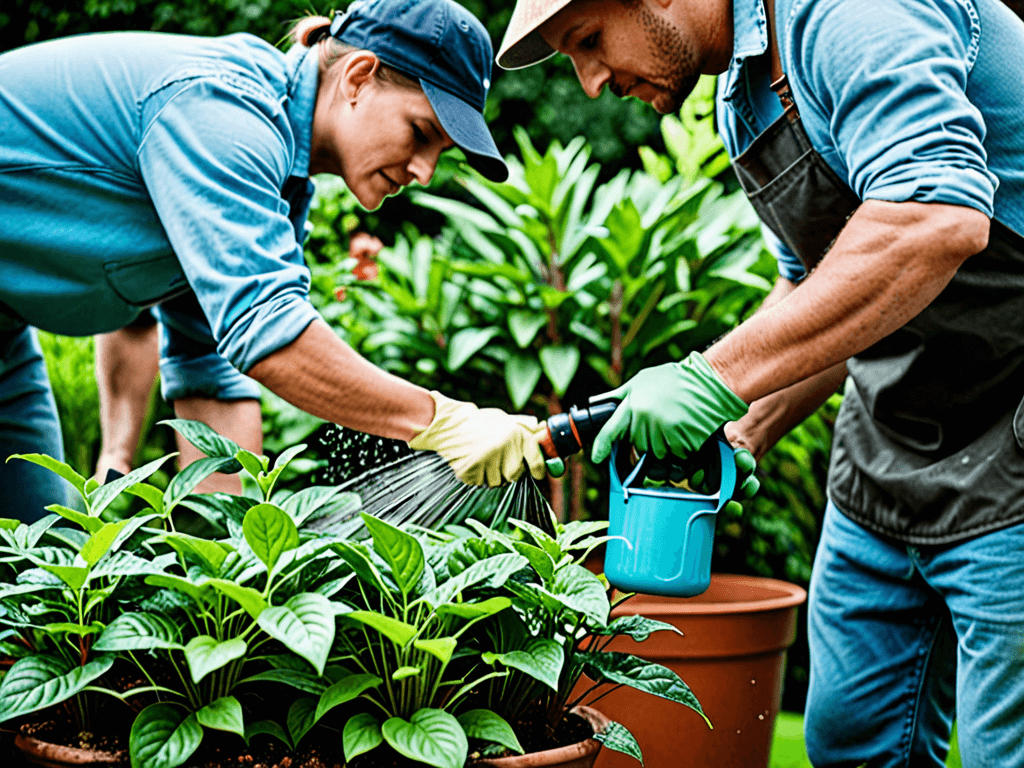Container gardening is a popular method for growing plants in limited spaces. However, it also comes with its own set of challenges, particularly when it comes to pest control. Pests can quickly damage your plants and reduce your harvest. In this article, we will explore effective pest control strategies specifically tailored for container gardening. From understanding common pests to implementing preventative measures and natural remedies, you’ll find valuable tips to keep your container garden thriving.
Understanding Common Pests in Container Gardening
Container gardening offers convenience, but it also attracts common pests. Identifying these pests is the first step towards effective pest control.Aphids, spider mites, and fungus gnats are typical nuisances. These tiny invaders can damage plants by sucking sap or spreading diseases.Recognize the signs of infestation, such as yellowing leaves or webbing, to address issues early.
Maintaining plant health is crucial, and so is regular inspection. Natural predators can also help manage pest populations, making this method both effective and eco-friendly.
Preventative Measures to Keep Pests at Bay
Preventing pests in container gardening starts with choosing high-quality soil and healthy plants. Always inspect new plants before introducing them to your garden.
Rotating plants and avoiding overcrowding helps ensure good airflow, reducing the chances of pest infestation. Use barriers like nets or row covers to keep bugs from reaching your plants.
Maintaining a clean garden, free of debris and dead leaves, can also deter pests. Regularly remove weeds, as they can harbor unwanted insects.
Introducing natural predators such as ladybugs can aid in controlling pest populations without chemicals.
Natural Remedies for Pest Control
Using natural remedies for pest control in container gardening is both eco-friendly and effective. Neem oil is a popular choice due to its ability to disrupt the life cycle of insects. Diluted in water, it can be sprayed directly onto plants.
Another remedy is insecticidal soap, which is gentle on plants but harsh on pests like mites and aphids. Garlic and chili pepper sprays can deter bugs with their strong odor and taste.
Additionally, diatomaceous earth, a natural powder, can be sprinkled around plant bases to dehydrate and kill soft-bodied insects. Combining these methods can help maintain a healthy, pest-free garden.
Chemical Options for Severe Infestations
In cases of severe infestations, chemical options might be necessary to protect your container garden.Insecticides should be used cautiously and as a last resort.
Products containing pyrethroids or neonicotinoids can be effective, targeting a wide range of pests.It’s important to follow label instructions to minimize harm to beneficial insects and the environment.
Systemic insecticides are absorbed by the plant, offering extended protection but should be used carefully.
Consider spot-treating affected areas rather than widespread application to reduce the chemical footprint.
Maintaining Healthy Plants to Prevent Pests
Keeping plants healthy is key to preventing pests in container gardening. Begin by selecting appropriate containers with good drainage to avoid waterlogged soil.
Choose quality potting mix that provides essential nutrients and discourages pest attraction.
Ensure your plants receive adequate sunlight based on their specific needs and water them consistently without overwatering.
Regularly inspect plants for signs of stress, such as yellowing leaves or stunted growth, and address issues promptly.
Applying organic fertilizers can strengthen plants and make them more resilient to pest attacks, ensuring a robust garden environment.
Summing Up Container Gardening Pest Control
Effective pest control in container gardening combines preventative measures, natural remedies, and, if needed, careful chemical use. Start by understanding common pests and using healthy practices to minimize their impact.
Employ barriers, natural predators, and homemade remedies to maintain a balanced ecosystem. For severe infestations, select pesticides that are targeted and environmentally safe, ensuring they are used as a last resort.
Ultimately, maintaining healthy plants is the best defense. Provide them with the right conditions, nutrients, and care to thrive, reducing their vulnerability to pests.
By following these strategies, your container garden can flourish, staying vibrant and pest-free.
FAQ – Frequently Asked Questions About Container Gardening Pest Control
What are some common pests found in container gardens?
Common pests include aphids, spider mites, and fungus gnats, which can damage plants by sucking sap or spreading diseases.
How can I prevent pests in my container garden?
Prevent pests by choosing high-quality soil, ensuring good drainage, and avoiding overcrowding to maintain good airflow.
What are natural remedies for pest control?
Natural remedies include neem oil, insecticidal soap, garlic and chili pepper sprays, and diatomaceous earth.
Are there chemical options for severe infestations?
Yes, use insecticides with pyrethroids or neonicotinoids cautiously and follow label instructions to minimize environmental impact.
How does maintaining healthy plants prevent pests?
Healthy plants are more resilient to pests. Proper watering, sunlight, and organic fertilizers help in keeping plants robust.


